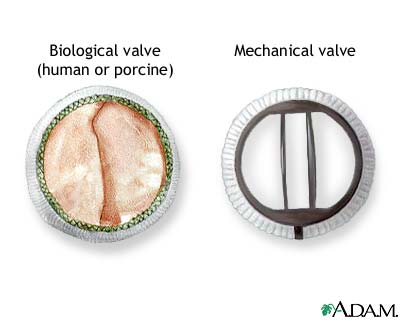


 |  |  |
| | ||
Heart valve surgery - series: Procedure, part 2
 |
|
Valves may be repaired or replaced. Replacement heart valves are either natural (biologic) or artificial (mechanical). Natural valves are from human donors (cadavers), modified natural valves are from animal donors (porcine: pigs) which are placed in synthetic rings, and artificial valves are made of metal or plastic. Natural valves rarely require life-long medication to prevent blood clot formation (anticoagulation), whereas artificial valves will require anticoagulation.
The advantage of mechanical valves is that they last longer-thus, the tradeoff of lifelong anticoagulation in some cases is worth it to avoid a second valve replacement surgery.
Update Date: 5/15/2008 Updated by: Robert A. Cowles, MD, Assistant Professor of Surgery, Columbia University College of Physicians and Surgeons, New York, NY. Review provided by VeriMed Healthcare Network. Also reviewed by David Zieve, MD, MHA, Medical Director, A.D.A.M., Inc.
